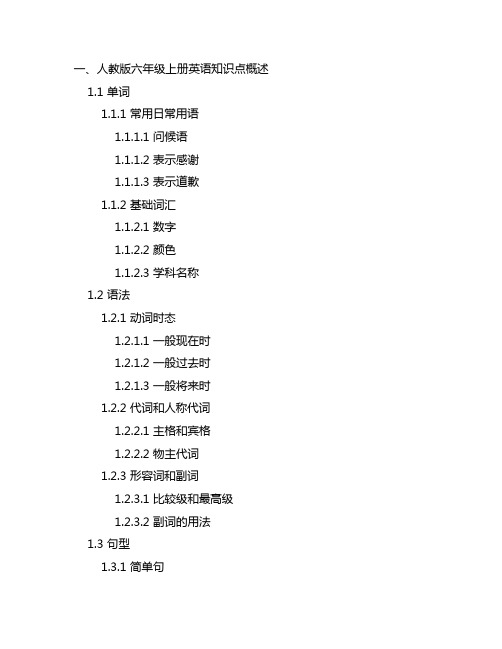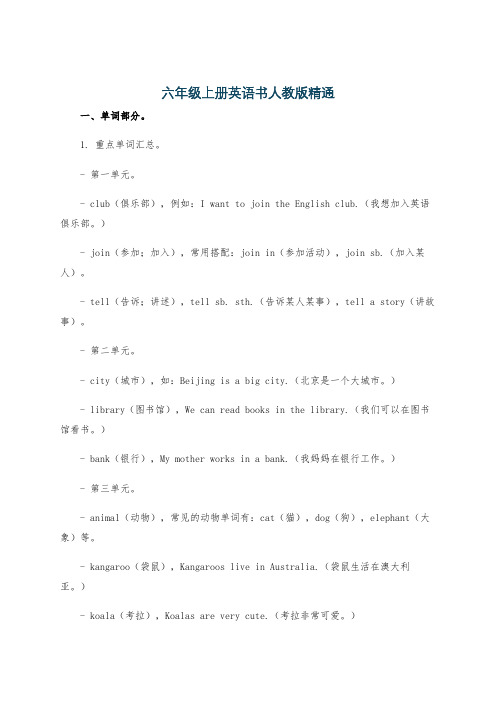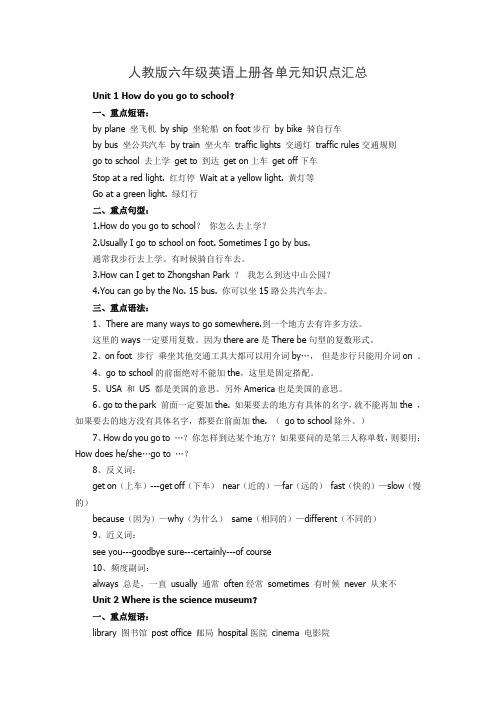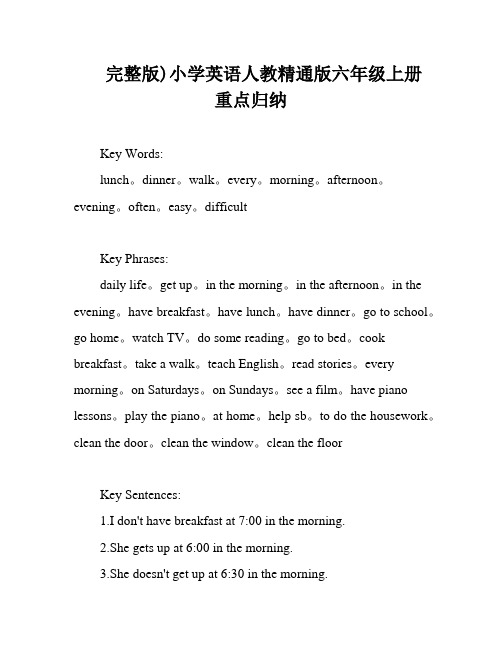(完整版)小学英语人教精通版六年级上册重点归纳
人教精通版六年级英语上册各单元知识点汇总

人教精通版六年级英语上册各单元知识点汇总Unit 1 I go to school at 8:00.单元知识必备清单重点词汇breakfast 早餐lunch 午餐dinner 晚餐walk 走; 步行every 每一个morning 早晨evening 晚上; 傍晚often 时常; 常常afternoon 下午easy 容易difficult 困难重点短语see a film 看电影clean the window 擦窗户c lean the door 擦门clean the floor 擦地板get up 起床take a walk 散步go to school 去上学have breakfast 吃早餐go home 回家go to bed 睡觉cook breakfast 做早餐teach English 教英语read stories 读故事have lunch 吃午饭have dinner 吃晚饭play the piano 弹钢琴重点句型1 School begins at 9:00. 九点钟开始上课。
解读: 该句是一般现在时,其中主语School 是第三人称单数,所以谓语动词begin 用第三人称单数形式begins。
“School begins.”的同义句为“Class begins.”。
2 School is over at 3:30 in the afternoon. 下午三点半放学。
解读: 该句是谓语为系动词的一般现在时句型,主语School 是第三人称单数,所以be动词用is,“be over”意为“结束”,over 在此处是副词。
3 She gets up at 6:00 in the morning. 她在早晨六点起床。
She doesn’t get up at 6:30 in the morning. 她不在早晨六点半起床。
解读: 在一般现在时的肯定句中,主语是第三人称单数时,谓语动词要用第三人称单数形式。
六年级英语上册(精通版)Unit 6必备知识点

六年级英语上册(精通版)Unit 6 There are four seasons in a year.必备知识点六年级英语上册(精通版)Unit 6 "There are four seasons in a year."的必备知识点归纳如下:一、核心词汇1. 季节词汇:spring(春天)、summer(夏天)、autumn (秋天)、winter(冬天)2. 其他相关词汇:season(季节)、weather(天气)、leaf (叶子,复数形式为leaves)、flower(花)、snowman(雪人)、rain(雨,下雨时为rainy)、heavy rain(暴雨)二、拓展词组1. 季节特点描述:green season(绿色的季节,通常指春天)the hottest season(最热的季节,通常指夏天)golden season(金色的季节,通常指秋天)white season(白色的季节,通常指冬天,因为雪是白色的)2. 季节相关活动:go on a trip(去旅游)go to a summer camp(去夏令营)have summer holidays(过暑假)farm the land(种田)fly kites(放风筝)make a snowman(堆雪人)sweep the snow(扫雪)pick apples(摘苹果)cut rice(割稻子,也可表述为harvest rice)三、核心句型1. 季节数量表达:There are four seasons in a year.(一年有四个季节。
)2. 季节特点描述:Spring is the green season.(春天是绿色的季节。
)Summer is the hottest season of the year.(夏天是一年中最热的季节。
)Autumn is the golden season.(秋天是金色的季节。
人教版六年级上册英语知识点汇总

一、人教版六年级上册英语知识点概述1.1 单词1.1.1 常用日常用语1.1.1.1 问候语1.1.1.2 表示感谢1.1.1.3 表示道歉1.1.2 基础词汇1.1.2.1 数字1.1.2.2 颜色1.1.2.3 学科名称1.2 语法1.2.1 动词时态1.2.1.1 一般现在时1.2.1.2 一般过去时1.2.1.3 一般将来时1.2.2 代词和人称代词1.2.2.1 主格和宾格1.2.2.2 物主代词1.2.3 形容词和副词1.2.3.1 比较级和最高级1.2.3.2 副词的用法1.3 句型1.3.1 简单句1.3.1.1 肯定句1.3.1.2 否定句1.3.1.3 疑问句1.3.2 复合句1.3.2.1 并列句1.3.2.2 定语从句1.3.2.3 状语从句二、人教版六年级上册英语知识点详解2.1 单词2.1.1 常用日常用语2.1.1.1 问候语问候语是指在英语日常交际中用于打招呼和示好的常用词汇,包括Hello、Hi、Good morning、Good afternoon等等。
2.1.1.2 表示感谢表示感谢的常用词汇有Thank you、Thanks a lot、Thank you very much等,用于表达对别人的帮助或礼物表示感激之情。
2.1.1.3 表示道歉表示道歉的词汇包括I'm sorry、Excuse me、Pardon等,在日常生活中,用于向别人道歉或请求对方让步的场合。
2.1.2 基础词汇2.1.2.1 数字数字是英语基础词汇的重要部分,包括基本的数字表达方式和计量单位,如one、two、three等,以及hundred、thousand等。
2.1.2.2 颜色颜色是描述事物外观的重要词汇,在日常交流中也经常用到,包括red、blue、yellow等常见颜色词汇。
2.1.2.3 学科名称学科名称涉及到人们日常生活和学习工作的方方面面,包括mathematics、music、art等,是学习英语时必须掌握的词汇。
六年级上册英语书人教版精通

六年级上册英语书人教版精通一、单词部分。
1. 重点单词汇总。
- 第一单元。
- club(俱乐部),例如:I want to join the English club.(我想加入英语俱乐部。
)- join(参加;加入),常用搭配:join in(参加活动),join sb.(加入某人)。
- tell(告诉;讲述),tell sb. sth.(告诉某人某事),tell a story(讲故事)。
- 第二单元。
- city(城市),如:Beijing is a big city.(北京是一个大城市。
)- library(图书馆),We can read books in the library.(我们可以在图书馆看书。
)- bank(银行),My mother works in a bank.(我妈妈在银行工作。
)- 第三单元。
- animal(动物),常见的动物单词有:cat(猫),dog(狗),elephant(大象)等。
- kangaroo(袋鼠),Kangaroos live in Australia.(袋鼠生活在澳大利亚。
)- koala(考拉),Koalas are very cute.(考拉非常可爱。
)- 第四单元。
- hobby(爱好),My hobby is painting.(我的爱好是绘画。
)- reading(阅读),He likes reading books.(他喜欢读书。
)- dancing(跳舞),She is good at dancing.(她擅长跳舞。
)- 第五单元。
- country(国家),China is a great country.(中国是一个伟大的国家。
)- Australia(澳大利亚),There are many unique animals in Australia.(澳大利亚有很多独特的动物。
)- Canada(加拿大),Canada is famous for its maple leaves.(加拿大以枫叶闻名。
(完整版)人教版六年级英语上册各单元知识点汇总,推荐文档

人教版六年级英语上册各单元知识点汇总Unit 1 How do you go to school?一、重点短语:by plane 坐飞机by ship 坐轮船on foot步行by bike 骑自行车by bus 坐公共汽车by train 坐火车traffic lights 交通灯traffic rules交通规则go to school 去上学get to 到达get on上车get off下车Stop at a red light. 红灯停Wait at a yellow light. 黄灯等Go at a green light. 绿灯行二、重点句型:1.How do you go to school?你怎么去上学?ually I go to school on foot. Sometimes I go by bus.通常我步行去上学。
有时候骑自行车去。
3.How can I get to Zhongshan Park ?我怎么到达中山公园?4.You can go by the No. 15 bus. 你可以坐15路公共汽车去。
三、重点语法:1、There are many ways to go somewhere.到一个地方去有许多方法。
这里的ways一定要用复数。
因为there are是There be句型的复数形式。
2、on foot 步行乘坐其他交通工具大都可以用介词by…,但是步行只能用介词on 。
4、go to school的前面绝对不能加the,这里是固定搭配。
5、USA 和US 都是美国的意思。
另外America也是美国的意思。
6、go to the park 前面一定要加the. 如果要去的地方有具体的名字,就不能再加the ,如果要去的地方没有具体名字,都要在前面加the. (go to school除外。
)7、How do you go to …?你怎样到达某个地方?如果要问的是第三人称单数,则要用:How does he/she…go to …?8、反义词:get on(上车)---get off(下车)near(近的)—far(远的)fast(快的)—slow(慢的)because(因为)—why(为什么)same(相同的)—different(不同的)9、近义词:see you---goodbye sure---certainly---of course10、频度副词:always 总是,一直usually 通常often经常sometimes 有时候never 从来不Unit 2 Where is the science museum?一、重点短语:library 图书馆post office 邮局hospital医院cinema 电影院bookstore书店science museum科学博物馆turn left向左转turn right 向右转go straight 直行north北south南east东west西next to靠近、与……。
人教精通版小学英语六年级上册单元知识点总结(全册)(完美版)

Unit1Igotoschoolat8:00.一、核心词汇1.描述日常活动的词汇cleanthewindow擦窗户cleanthedoor擦门cleanthefloor擦地板2.描述三餐的词汇breakfast早餐lunch午餐dinner晚餐3.描述时间的词汇morning早晨afternoon下午evening晚上; 傍晚4.频率副词often时常; 常常5.其他walk走; 步行every每一个easy容易difficult困难二、拓展词组描述日常活动的词组getup起床havebreakfast吃早餐gotoschool去上学havelunch吃午饭gohome回家havedinner吃晚饭watchTV看电视gotobed睡觉cookbreakfast做早餐teachEnglish教英语takeawalk散步readstories读故事seeafilm看电影playthepiano弹钢琴三、核心句型1.Igetupat7:30inthemorning. 我早晨七点半起床。
解读:此句是一个陈述句, 用来描述我在某一时刻所做的事情。
举一反三:Igotoschoolat8:00inthemorning. 我早晨八点去上学。
她不在上午六点半起床。
2.Shedoesn’tgetupat6:30inthemorning.解读: 此句是一个否定句, 用来描述某人在某一时刻没有做的事情。
举一反三:Shedoesn’tgetupat6:40.她不在六点四十分起床。
3.— WhatdoyoudoonSaturdays? 你星期六做什么?— Ioftengoandseeafilmwithmyparents. 我经常和我的父母一起去看电影。
解读:这是用来询问对方某天做什么及其回答的句子。
举一反三:— Whatdoyoudoontheweekend? 你周末做什么?— Ioftendohomework. 我经常做作业。
完整版)小学英语人教精通版六年级上册重点归纳

完整版)小学英语人教精通版六年级上册重点归纳Key Words:lunch。
dinner。
walk。
every。
morning。
afternoon。
evening。
often。
easy。
difficultKey Phrases:daily life。
get up。
in the morning。
in the afternoon。
in the evening。
have breakfast。
have lunch。
have dinner。
go to school。
go home。
watch TV。
do some reading。
go to bed。
cook breakfast。
take a walk。
teach English。
read stories。
every morning。
on Saturdays。
on Sundays。
see a film。
have piano lessons。
play the piano。
at home。
help sb。
to do the housework。
clean the door。
clean the window。
clean the floorKey Sentences:1.I don't have breakfast at 7:00 in the morning.2.She gets up at 6:00 in the morning.3.She doesn't get up at 6:30 in the morning.4.What does Kate do on Saturdays?5.She usually plays the piano.6.I have breakfast at 7:30.In daily life。
we have three meals a day: lunch。
dinner。
and breakfast。
We often walk to school。
小学英语人教精通版六年级上册重点归纳

小学英语人教精通版六年级上册重点归纳第一单元Unit 1 重点单词:lunch 午餐every 每一个evening 晚上difficult困难重点词组:1. daily life 日常生活3. in the morning 在早晨上午5. in the evening 在晚上7. have lunch 吃午餐walk 走;步行afternoon 下午easy容易2. get up 起床4. in the afternoon 在下午6. have breakfast 吃早餐8. have dinner 吃晚餐10. go home 回家12. do some reading 阅读14. cook breakfast 做早餐16. teach English 教英语18. every morning 每天早晨20. on Sundays 在星期日22. have Pia no IeSS OnS 上钢琴课24. at home 在家25. help sb. to do the housework帮助某人做家务26. clea n the door扌察门27. clean the window 擦窗户I go to school at 8:00dinner 晚餐morning 早上often时常;常常9. go to school 去上学11. watch TV 看电视13. go to bed 睡觉15. take a walk 散步17. read stories 读故事19. on Saturdays 在星期六21. see a film 看电影23. play the piano 弹钢琴28. clean the floor 擦地板重点句型:1.I don'h t ave breakfast at 7:00 in the morning .我不是在早上七点钟吃早餐。
2.She gets up at 6:00 in the morning 她. 在早上六点钟起床。
- 1、下载文档前请自行甄别文档内容的完整性,平台不提供额外的编辑、内容补充、找答案等附加服务。
- 2、"仅部分预览"的文档,不可在线预览部分如存在完整性等问题,可反馈申请退款(可完整预览的文档不适用该条件!)。
- 3、如文档侵犯您的权益,请联系客服反馈,我们会尽快为您处理(人工客服工作时间:9:00-18:30)。
(完整版)小学英语人教精通版六年级上册重点归纳小学英语人教精通版六年级上册重点归纳第一单元Unit 1 I go to school at 8:00重点词组:1. daily life 日常生活2. get up 起床3. in the morning 在早晨\上午4. in the afternoon 在下午5. in the evening 在晚上6. have breakfast 吃早餐7. have lunch 吃午餐8. have dinner 吃晚餐9. go to school 去上学10. go home 回家11. watch TV 看电视12. do some reading 阅读13. go to bed 睡觉14. cook breakfast 做早餐15. take a walk 散步16. teach English 教英语17. read stories 读故事18. every morning 每天早晨19. on Saturdays 在星期六20. on Sundays 在星期日21. see a film 看电影22. have piano lessons 上钢琴课23. play the piano 弹钢琴24. at home 在家25. help sb. to do the housework 帮助某人做家务26. clean the door 擦门27. clean the window 擦窗户28. clean the floor 擦地板29. eat lunch 吃午餐重点句型:1.I don’t have breakfast at 7:00 in the morning . 我不是在早上七点钟吃早餐。
2.She gets up at 6:00 in the morning . 她在早上六点钟起床。
3.She doesn’t get up at 6:30 in the morning . 她不是在早上6:30起床。
4.What does Kate do on Saturdays? 凯特在周六做什么?5.She usually plays the piano. 她通常弹钢琴。
6.I have breakfast at 7:30. 我在7:30吃早饭。
7.I have lunch at 12:00. 我在12:00吃午饭。
8.I have dinner at 6:00. 我在6:00吃晚餐。
9.What do you do on Saturdays? 你在周六干什么?10.I often go and see a film. 我经常去看电影。
第二单元Unit 2 What's your hobby?重点词组:1. a new toy car 一辆新的玩具汽车2. have a look 看一看3. collect toy cars 收集玩具汽车4. collect stamps 收集邮票5. collect maps收集地图6. collect picture cards 收集卡片7. look at 看8. plant flowers 种花9. drink Chinese tea 喝中国茶10. go fishing 去钓鱼11. cook meals 做饭12. be interested in…对……感兴趣13. make dolls 做布娃娃14. play computer games 玩电脑游戏15. take photos 照相16. take good care of 照顾好17. talk about 谈论 18. play basketball 打篮球19. look for 寻找20. in winter 在冬天21. from…to…从……到……22. at night 在夜间23. in the world 在世界上重点句型:1. What’s your grandpa’s hobby? 你爷爷的爱好是什么?2. His hobby is fishing . 他的爱好是钓鱼。
3. What are you interested in? 你对什么感兴趣?4. I’m interested in taking photos. 我对拍照感兴趣。
5. What’s your hobby? 你的爱好是什么?6. My hobby is collecting maps. 我的爱好是收集地图。
6. What’s your dad’s hobby? 你爸爸的爱好是什么?7. His hobby is planting flowers . 他的爱好是种花。
第三单元Unit 3 Would you like to come to my birthday party?重点词组:1. birthday party 生日聚会2. after school 放学后3. invitation card 邀请卡4. invite your friends to your party 邀请朋友参加聚会5. celebrate your birthday with your friends 与朋友庆祝生日6. give a birthday card to your friend 向朋友赠送生日贺卡7. star-shaped cake 星形蛋糕 8. heart-shaped cake 心形蛋糕9. fruit pie 水果派\水果馅饼10. light the candles 点蜡烛11. sing the birthday song 唱生日歌12. make a wish 许愿13. blow out the candles 吹蜡烛14. cut the cake 切蛋糕15. eat the cake 吃蛋糕16. a piece of cake 一块蛋糕重点句型:1. What kind of cake would you like? 你想要什么种类的蛋糕?2. I’d like a heart-shaped cake. 我想要一个心形的蛋糕。
3. How do they celebrate the birthday? 他们怎么庆祝生日的?4. First, they light the candles and then 首先,他们点燃蜡烛,然后……5. Would you like to come to my birthday party? 你愿意来我的生日晚会吗?6. Sure. I’d love to . 当然,我愿意。
7. Good bye!/Bye-bye!/Bye! 再见。
8. Can I have some ice cream ? 我能吃些冰激凌吗?9. Here’s a birthday cake for you . 这个生日蛋糕师送给你的。
10. invite your friends to your party 邀请你的朋友到你的晚会11. celebrate your birthday with your friends 和你的朋友一起庆祝你的生日12. give a birthday card to your friend 把这个生日卡片给你朋友第四单元Unit 4 January is the first month重点词组:1. the first month of the year 一年里的第一个月2. the second month of the year一年里的第二个月3. New Year’s Day 新年4. Spring Festival 春节5. Tree Planting Day 植树节6. Labor Day \May Day 劳动节7. Mother’s Day 母亲节8. Children’s Day 儿童节9. Father’s Day 父亲节10. plant trees 植树11. the third month of the year 一年里的第三个月12. the fourth month of the year 一年里的第四个月13. the fifth month of the year 一年里的第五个月14. the sixth month of the year 一年里的第六个月15. go back home 回家16. in the south of China 在中国南方17. all the day 一整天18. in March 在三月19. take a photo 照相20. go on a trip 旅行重点句型:1. January is the first month of the year. 一月份是一年中的第一个月。
2. February is the second month of the year. 二月份是一年中的第二个月。
3. March is the third month of the year . 三月份是一年中的第三个月。
4. April is the fourth month of the year. 四月份是一年中的第四个月。
5. May is the fifth month of the year . 五月份是一年中的第五个月。
6. June is the sixth month of the year . 六月份是一年中的第六个月。
第五单元Unit 5 July is the seventh month重点词组:1. the seventh month of the year 一年里的第七个月2. July 1st 七月一日3. the Communist Party of China 中国共产党4. Party members 党员5. the eighth month of the year一年里的第八个月6. Amy Day 建军节7. National Day 国庆节8. Teachers’ Day 教师节9. Thanksgiving Day 感恩节10. on August 1st 在八月一日11. in August 在八月12. summer holidays 暑假13. the party’s birthday 党的生日14. the ninth month of the year 一年里的第九个月15. go back to school 回到学校16. Santa Claus 圣诞老人17. the tenth month of the year 一年里的第十个月18. the eleventh month of the year一年里的第十一个月19. the twelfth month of the year 一年里的第十二个月重点句型:1. July is the seventh month of the year. 七月是一年中的第七个月。
